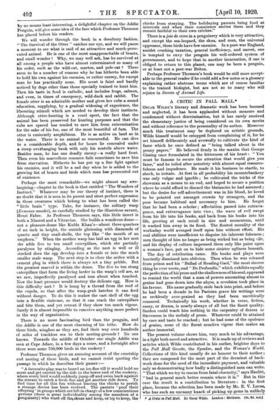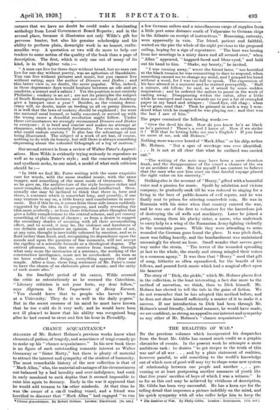A CRITIC IN PALL MALL*
OSCAR WILDE's literary and dramatic work has been boomed and neglected, it has been applauded without measure and condemned without discrimination, but it has rarely received the elementary justice of being considered on its own merits and without reference to the personality of its author. However much this treatment may be deplored on artistic grounds, Wilde himself would be estopped from complaining of it, for he set himself deliberately and avowedly to cultivate the kind of fame which he once defined as " being talked about in the penny papers." He believed firmly in the maxim that George Gissing once formulated in the bitterness of his heart : " You must be famous to secure the attention that would give you fame," and he toiled after notoriety with almost equal resource- fulness and impudence. He made it his business to startle, to shock, to irritate. At first in all probability his mountebankery was only vulgar and ignoble ; he cultivated the tricks of the showman as a means to an end, and hoped to secure a position where he could afford to discard the blatancies he had assumed ; but the desire for self-advertisement was in his blood, he loved to be pointed out amongst crowds by strangers, and the pose became habitual and necessary to him. He forgot that he had been a scholar ; affectation passed into extrava- gance, and extravagance into vice ; the wave of evil swept from his life into his books, and back from his books into his life, growing at each recoil in size and momentum, until it washed him away in its flood. The flouted morality of the workaday world avenged itself upon him without effort. His real abilities were insufficient to disguise his inherent falseness ; men thought of him no longer as being wicked but as being Tile, and his display of culture impressed them only like paint upon a woman's face, put on to hide some sinister ugliness beneath.
The day of retribution came. His books and plays were hurriedly dismissed into oblivion. Then when he was released from prison and his "Ballad of Reading Gaol," the most sincere thing he ever wrote, and " De Prof undis," which exhibits equally the perfection of hidprose and the shallowness of his soul, appeared to remind the world that a man of powers amounting almost to genius had gone down into the abyss, a revulsion took place in his favour. His name gradually stole back into print, and before he had been a decade in his Parisian grave his writings were as recklessly over-praised as they had been uncritically censured. Technically his work, whether in verse, fiction, essay, or drama, is nearly always of all but the finest quality.
Sardou could teach him nothing in the carpentry of drama or Stevenson in the melody of prose. Whatever could be attained by care and taste he reached ; but he had none of the opulence of genius, none of the fluent creative vigour that makes an author immortal.
The present volume shows him, very much to his advantage, in a light both novel and attractive. It is made up of reviews and articles which Wilde contributed in his earlier, brighter days to the Pall Mall Gazette, the Speaker, and the Woman's World. Collections of this kind usually do no honour to their author ; they are composed for the most part of the dreariest of hack- work done for the need of the immediate payment, and valuable only as demonstrating how badly a distinguished man can write. " That which we try to rescue from fatal obscurity," says Hazlitt, " had in general much better remain where it is." But in this case the result is a contribution to literature : in the first place, because the selection has been made by Mr. E. V. Lucas, who has such an uncanny knack of picking up gems in unlikely .° 4 Critic in Pall Mall. Br Oscar Wilde. London : Methuen. 16s. 6d. net,' corners that we have no doubt he could make a -fascinating anthology from Local Government Board Reports ; and in the second place, because it illustrates not only Wilde's gift for perverse banter, but also his genuine seholarsbip and his ability to perform plain, downright work in an honest, crafts- manlike way. A quotation or two will do more to help our readers to some notion of. the quality of the book than a page of description. The first, which is only one out of many of its kind, is in the lighter vein :- " A man can live for three days without bread, but no man can live for one day without poetry, was an aphorism of Baudelaire. You can live without pictures and music, but you cannot live without eating, says the author of Dinners and Dishes ; and this latter" view is, no doubt, the more popular. Who, indeed; in these degenerate days would hesitate between an ode and an omelette, a sonnet and a salmis ? Yet the position is not entirely Philistine ; cookery is an art ; are not its principles the subject of South Kensington lectures, and does not the Royal Academy give a banquet once a year ? Besides, as the coming demo- cracy will, no doubt, insist on feeding us all on penny dinners, it is well that the laws of cookery should be explained ; for were the national meal burned, or badly seasoned, or served up with the wrong sauce a dreadful revolution might follow. Under these circumstances we strongly recommend Dinners and Dishes to everyone : it is brief and concise and makes no attempt at eloquence, which is extremely fortunate.. For even on ortolans who could endure oratory ? It also has the advantage of not being illustrated. The subject of a work of art has, of course, nothing to do with its beauty, but still there is always something -depressing about the coloured lithograph of a leg of mutton."
- Our second extract is from a review of Walter Pater's Appreci- ations. Here Wilde is evidently trying seriously to reproduce as well as to explain Pater's style ; and the concurrent analysis and synthesis make, to our mind, a model of what such criticism should be :— " In 1868 we find Mr. Pater writing with the same exquisite care for words, with the same studied music, with the same temper, and something of the same mode of treatment. But, as he goes on, the architecture of the style becomes richer and more complex, the epithet more precise and intellectual. Occa- sionally one may be inclined to think that there is, here and there, a sentence which is somewhat long, and possibly, if one may venture to say so, a little heavy and cumbersome in move- ment. But if this be so, it comes from those side-issues suddenly suggested by the idea in ifs progress, and really revealing the idea more perfectly ; or from those felicitous after-thoughts that give a fuller completeness to the central scheme, and yet convey something of the charm of chance ; or from a desire to suggest the secondary shades of meaning with all their accumulating effect, and to avoid, it may be, the violence and harshness of too definite and exclusive an opinion. For in matters of art, at any rate, thought is inevitably coloured by emotion, and so is fluid rather than fixed, and, recognizing its dependence upon the moods and upon the passions of fine moments, will not accept the rigidity of a scientific formula or a theological dogma. The critical pleasure, too, that we receive from tracing, through what may seem the intricacies of a sentence, the working of the constructive intelligence, must not be overlooked. As soon as we have realized the design, everything appears clear and simple. After a time, these long sentences of Mr. Pater's come to have the charm of an elaborate piece of music, and the unity of such music also."
In the limelight period of his career, Wilde scorned the critic as ostentatiously as he scorned the Catechism. " Literary criticism is not your forte, my dear fellow," says Algernon in The Importance of Being Earnest. "You should leave that to people. who haven't been at a University.' They do it so well in the daily papers." But in the secret recesses of his mind he must have known that he too could do it very well; and he would have been not ill pleasei to know that his ability was recognized long after he had ceased to strut and fret his hour in Piccadilly.



































 Previous page
Previous page